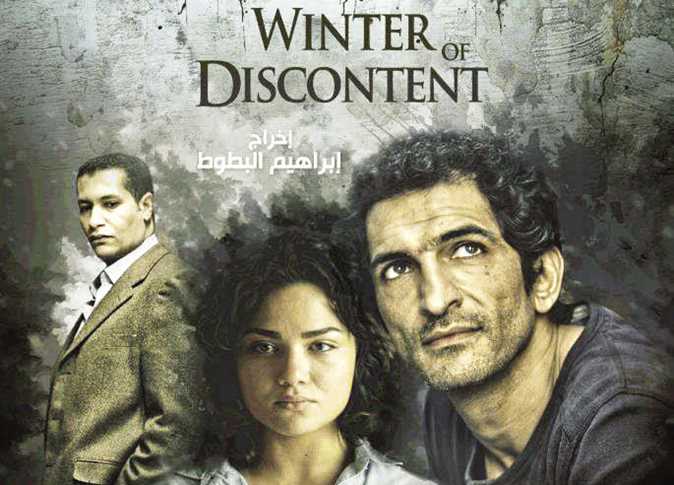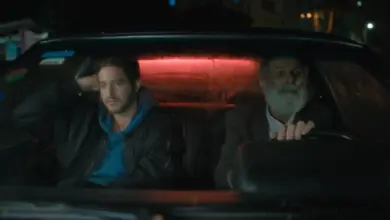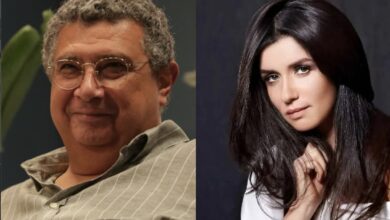
The films that were based on the first impressions of the January 25 Revolution fit into a number different genres. Some tackle the revolution, chaos and the fall of martyrs through comic scenes that make the audience laugh, while others delve into the political, social and economic factors of the revolution.
These films, especially the non-comic ones, could not be screened in public, as some of them have not been approved by censorship authorities, according to what was announced by filmmakers, despite their success to document the events of the January 25 revolution and what Egyptians went through at the time.
Over the past seven years, more than 30 documentary films have been produced on the revolution, including director Ahmed Rashwan’s “Mawloud fi 25 Yanayer” (Born on 25 January),
Mona al-Iraqi’s “Goma al-Raheel; (Friday of Departure), “Eid Wahda” (One Hand) by al-Nakhshary Abdallah, and “Hazr Tagawol” (Curfew) by Ahmed al-Tanbouly.
Others include: “Esmi Midan al-Tahrir” (My Name is al-Tahrir Square) by Ali al-Juhainy, “Mawkeat al-Gamal” (The Battle of the Camel) by Ahmed Abdel Hafez, “Oyoun al-Horreya” (The Eyes of Freedom) by Ahmed Salah Eddin, “Bard Yanayer” (January’s Coldness) by Romany Saad, “18 Yoam fi Masr” (18 Days in Egypt) by Ahmed Salah, “Ghanny Horreya” (Sing Freedom) by Ahmed al-Hawary, and “al-Awda ila al-Midan” (The Return to the Square) by Czech director Petr Lom.
And then there is there are the films “Ana wel Ajenda” (I and the Agenda) by Nevine Shalaby, “Nesf Sawra” (Half a Revolution) by Karim Abdel Hakim, “Regheef Aish w Horreya” (A Loaf of Bread and Freedom) by Tarek al-Zorkany, and “al-Shaheed wal Midan” (The Martyr and the Square) by Ali al-Ghazaly.
It is also impossible to ignore a number of fictional art works that attempted to catch up with the revolution, as some of them participated in international film festivals, beside the documentary films that garnered prizes.
The Berlin Film Festival screened a number of documentaries, including “al-Thawra Khabar” (The Revolution is News) which was produced by Al-Masry Al-Youm.
It recounted the stories of journalists who covered the revolution’s events, and was directed by Bassam Mortada.
Berlin Film Festival also screened “Kalam Shohoud” (Witnesses Talk) by Mai Iskandar.
Comedy films on the January 25 revolution were dim as the event was too serious to be represented in a naive superficial way, according to critic Khayreya al-Beshlawy.
Beshlawy added in special statements to Al-Masry Al-Youm: “Most of the comedies were bad, and did not achieve artistic or public success.”
“Tak tak Boom” presented by actor Mohamed Saad focused on thugs and the popular committees during the revolution, while Ahmed Eid’s film “Hazz Saeed” (Good Luck) tells the story of a young man who was forced to go look for his revolutionary sister in Tahrir Square, during which he was arrested by the police and tortured only to find out that his real place must be against the regime in Tahrir Square.
Beshlawy criticized the two films saying they did not have any effect and went unnoticed. “Sarkhet Namla” (An Ant’s Scream) was filmed before the revolution, and some scenes were added at its end on the revolution later on, she added.
Director Yousry Nasrallah was the most supportive of the January 25 revolution among directors of his own generation.
Late director Mohamed Khan, for example, believed that it was necessary to wait until a full vision of the revolution became clear.
Nasrallah told Al-Masry Al-Youm: “If I do not make a film while I am still excited by the events, then when am I going to make it?”
Nasrallah represented the revolution in his movies “18 Yoam” (18 Days), and “Baad al-Mawkea” (After the Battle) starring Menna Shalaby and Bassem Samra.
Baad al-Mawkea participated in Cannes Film Festival, after 15 years of absence for an Egyptian film since “al-Maseer” (Destiny) movie by the late director Youssef Chahine participated in the festival.
Although Baad al-Mawkea was criticized for trying to defend the perpetrators of the Battle of the Camel which took place in Tahrir Square against protesters on February 2, 2011, by focusing on the perpetrator’s motives, Nasrallah remains one of the best directors who reflected the true spirit of the January 25 revolution, as well as the controversy it has raised among different sectors of Egyptian society.
In an exclusive statement to Al-Masry Al-Youm, Nasrallah said: “I was happy with the leakage of “18 Yoam” so that the public can finally see it. The film industry in general has deteriorated and filmmakers are suffering to afford their films…(especially) serious films.”
“The presentation of all political visions of what happened will not be complete due to the overlap many parties,” he added.
Among art works that reflect the first impressions of the January 25 revolution were movies based on superficial crusts that emanated from the glare of the event which rocked Egypt seven years ago just to be described as works that tackle revolution; others turned the revolution, chaos, and the fall of martyrs into comic scenes to make audiences laugh, some works truly depicted the January revolution, as the most recent revolution affecting all elements of political, economic and social life in Egypt.
These films, particularly non-comic ones, could not be screened in public, due to lack of approval from censorship authorities, according to filmmakers – despite depicting accurately the events of the January 25 revolution and what Egyptians went through.
Over the past seven years, more than 30 documentary films have been produced on the revolution. Among these films are Ahmed Rashwan’s ‘Mawloud fi 25 Yanayer’ (Born on January 25), Mona al-Iraqi’s ‘Gomet al-Raheel’ (Friday of Departure), ‘Eed Wahda’ (One Hand) by al-Nakhshary Abdallah, ‘Hazr Tagawol’ (Curfew) by Ahmed al-Tanbouly, ‘Esmi Midan al-Tahrir’ (My Name is Tahrir Square) by Ali al-Juhainy, ‘Mawkeat al-Gamal’ (The Battle of the Camels) by Ahmed Abdel Hafez, ‘Oyoun al-Horreya’ (The Eyes of Freedom) by Ahmed Salah Eddin, ‘Bard Yanayer’ (January’s Coldness) by Romany Saad, ‘18 Yoam fi Masr’ (18 Days in Egypt) by Ahmed Salah, ‘Ghanny Horreya’ (Sing Freedom) by Ahmed al-Hawary, ‘al-Awda ila al-Midan’ The Return to the Square) by Czech director Petr Lom, ‘Ana wel Ajenda’ (I and the Agenda) by Nevine Shalaby, ‘Nesf Sawra’ (Half a Revolution) by Karim Abdel Hakim, ‘Regheef Aish w Horreya’ (A Loaf of Bread and Freedom) by Tarek al-Zorkany, and ‘al-Shaheed wal Midan’ (The Martyr and the Square) by Ali al-Ghazaly.
It is also impossible to ignore a number of fictional works that attempt to catch-up with the revolution and discuss it. Alongside documentary films which claims film prizes, some of these have featured in international film festivals.
The Berlin Film Festival screened a number of documentaries, including ‘al-Thawra Khabar’ (The Revolution is News) which was produced by Al-Masry Al-Youm. It recounted stories of journalists who covered the revolutionary events, and was directed by Bassam Mortada. Berlin Film Festival also screened ‘Kalam Shohoud’ (Witnesses’ Talk) by Mai Iskandar.
Comedic films depicting the January 25 revolution were rather dim, as the event was too serious to be represented in a naive and superficial way, according to film critic Khayreya al-Beshlawy.
Beshlawy said in a statement to Al-Masry Al-Youm that “most of the comedies were bad, and did not achieve artistic or public success.”
‘Tak tak Boom’, presented by actor Mohamed Saad, focused on thugs and the popular committees during the revolution, while Ahmed Eid’s film ‘Hazz Saeed’ (Good Luck) tells the story of a young man who was forced to search for his sister in Tahrir Square during the revolution, which led to his arrest and torture by the police.
Beshlawy criticized the two films, saying they did not have any effect and went unnoticed. ‘Sarkhet Namla’ (An Ant’s Scream) was filmed before the revolution, and some scenes were added in the film’s closing scenes, showing the revolution, she added.
Director Yousry Nasrallah stood as one of the most supportive directors among his generation for the January 25 revolution. Late director Mohamed Khan, for example, considered it necessary to wait until a full picture of the revolution had emerged before depicting it.
Nasrallah raised a point to Al-Masry Al-Youm, asking “If I do not make a film while I am still excited by the events, then when am I going to make it?”
Nasrallah represented the revolution in his movies ‘18 Yoam’ (18 Days), and ‘Baad al-Mawkea’ (After the Battle), which starred Menna Shalaby and Bassem Samra.
‘Baad al-Mawkea’ featured in Cannes Film Festival, after a 15-year absence of Egyptian films, since the ‘al-Maseer’ (Destiny) by late director Youssef Chahine participated in the festival.
Although ‘Baad al-Mawkea’ was criticized for trying to defend the perpetrators in the the Battle of the Camel, which took place in Tahrir Square against protesters on February 2, 2011: by focusing on the perpetrators’ motives, Nasrallah remains one of the best directors who reflected accurately the spirit of the January 25 revolution, as well as the controversy it has raised among the different factions of Egyptian society.
In an exclusive statement to Al-Masry Al-Youm, Nasrallah said “I was happy with leakage of ’18 Yoam’ film so that the public can finally see it. The film industry in general has deteriorated and filmmakers are suffering to afford for the cost of their films…(especially) serious films.”
“The presentation of all political visions of what happened will not be complete due to the overlap many parties,” he added.
Seven prominent fictions and documentary movies on January 25th revolutions are as follows:
18 Youm [18 Days]
The movie combined ten short films, recorded by film directors Yusra Nasrallah, Sherif Arafa, Marwan Hamed, Kamel Abou Zekry, Ahmed Abd Allah, and Sherif al-Bendari. The movie depicts ten stories about social change which occurred in Egypt at the beginning of revolution. Producers leaked the movie on YouTube for the public show, after control authorities censored it.
Chief of censorship on Artistic Works Body, Khalid Abd al-Galel, confirmed that the producers did not present the movie on the censorship body, adding that it was first shown at special celebration of Egyptian cinema at Cannes Film Festival in 2011.
Tahrir 2011 – Al-Tayeb – Al-Shars- Al-Siasy [Tahrir 2011-The kind, Wicked, Politician]
Three movies tackle incidents in the revolution, from January 25 till February 11. ‘Tayeb’ (The Kind) is directed by Tamer Ezzat and shows opinions of different persons in Tahrir square on the revolution. ‘Al-Shars (The Wicked) is directed by Eiten Amen, who met police officers and asked them about the revolution, the film shows their responses. ‘Al-Siasy’ (The Politician) is directed by Amr Salama, who met famous political figures including Mohamed al-Baradei, Mostafa al-Feqi, and prominent author Alaa al-Aswany. The movie was shown in Venice International Film Festival and won the prize of best movie in Oslo Festival. The movie is among the finest movies that have reflected the revolutionary events. It was shown for three weeks in Egyptian cinemas, gathering LE 45,000 in revenues.
Farsh wa Ghata [Furnishing and Cover]
Farsh wa Ghata (Furnishing and Cover) is a combination of documentary and dramatic short movies and directed by Ahmed Abd Allah. The movie shows story of a young man who escaped prison during the revolution and started to view society from different angle.
The director observes life of inhabitants, standing besides graves, and slums, to reflect their conditions during the revolution. The movie is shown in “Afaq’ [Horizons] competition in Venice International Film Festival, and won several prizes at other festivals. Egypt nominated the movie to enter the Oscars.
Al-Midan [The Square]
The movie is directed by the Egyptian American Jihan Najim and tackles prominent incidents which occurred in Egypt after deposition of former presidents Hosni Mubarak in 2011 and Mohammed Morsi in 2013. The movie featured in several international and Arab festivals and won several prizes, including the Audience Award for Documentary Cinema at the Sundance Film Festival in 2013, and the Audience Choice Award for documentary movies at the Toronto International Film Festival 2013. The movie was nominated for the best documentary at the Oscars.
Bad al-Tofan [After the flood]
The move is directed by Ibrahim Batot and stars Hanan Mutawa, Reham Haggag, and Ahmed Azmy. It follows the story of a psychiatrist who conducts studies and research on some corrupt ministers.
Al-Sheta el-Fat [the last winter]
This movie is directed by Ibrahim Batot and stars Amr Waked and Farah Youssef. It introduces three humanitarian stories of a female television anchor, a computer engineer, and a police officer working in the State Security Apparatus. The film discusses causes which contributed to the outbreak of the January 25 revolution.
‘Nawara’
The movie is directed by Halah Khalel and stars Mena Shalaby, Mahmoud Hamida, and Amir Eid. It observes the condition of Egyptian society after the revolution by following the story of a maid. Shalaby won Best Actress at the Dubai Festival and the National Film Festival.



